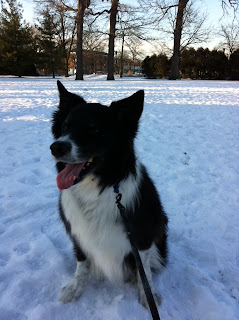 |
| "Chewy" is ready to play! |
My experience reading Atonement was heavily colored by my experience seeing the movie -- which is one of the reasons I generally don't like seeing a movie version until after I've read the book. I enjoyed the movie -- but I'm not sure whether or not I "liked" the book. It is certainly well-written and beautifully evocative, even powerful at times. It definitely evoked strong emotions in me as I read it, particularly at the very end.
My favorite part of the book was Part I, which is the part that occurs before the tragic event for which Briony, one of the main characters, later tries to atone. The first part of the novel is set in a British estate in the 1930s, and the description drips with sunshine and sultry days. Much of this part is spent developing characters -- which helped me understand the story much better than I understood it after watching the movie.
Side note: it bothers me when someone tries to make a movie out of a book that relies heavily on psychology and description of inner thoughts and motivations. I think that usually in these cases the movie fails to convey aspects of character and "action" that are crucial to the storyline -- it just doesn't work! That's my opinion about movies made from Henry James or Edith Wharton novels, and to some extent about the movie version of Atonement. I didn't really understand why Briony acts the way she does towards Robbie until I read the book. Ok, rant over.
I got a bit bored in the second part of the book, which focuses on Robbie and the infantry's retreat in France. Maybe I just don't like reading about war. Maybe I just get tired of reading about atrocities, or feel a bit emotionally manipulated. I don't know. But after finishing the book, I understand why the author spends so much time on this section -- and it breaks my heart.
Ok, SPOILER alert in this paragraph. You have now been warned. I think the main reason I'm not sure if I "liked" this book is because I found it so heartbreaking. Basically, in the very last chapter, the narrator (whom we discover is an elderly Briony) reveals that the "happy ending" to Robbie and Cecelia's relationship, which we read about in the previous chapter, was her own narrative invention. Robbie died in France. Cecelia died, heartbroken, in a bombing. And Briony lacked the courage to go see her sister. And so, at the end of the book we discover that everything we've read up to that point is actually Briony's own narrative, her attempt to atone for the wrong she caused. Even as I write that summary, I'm tearing up -- it's so tragic. Tragic to think of Cecelia and Robbie, their lives ruined just when their hopes were highest, just when they had found each other. Tragic to think of Briony carrying the weight of her error/lies with her for the rest of her life, with no real hope for atonement, only an endless attempt through her writing. This tragedy is too heavy for me.
Perhaps that's why I cannot say that I "like" Atonement -- reading it hurts too much. There is too much tragedy here -- and, paradoxically, too much beauty.

